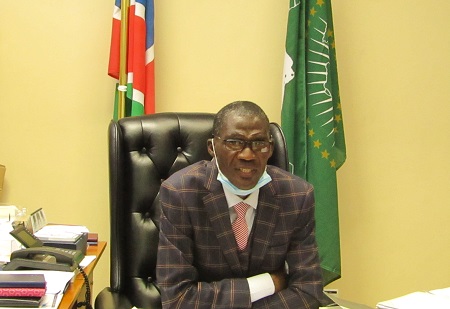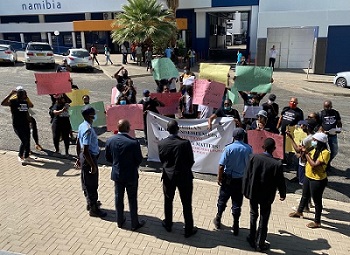
The University of Namibia (UNAM) Ogongo Campus continues to invest in rice cultivation, an initiative that seeks to improve food security and serve as income generating source for small-scale farmers in the Omusati Region.
Despite delayed rainfall, some farmers in the region also managed to cultivate rice in their fields’ seasonal wetlands (iishana).
This was said by Omusati Region Governor Erginus Endjala in his State of the Region Address (SORA) delivered at Outapi on 13 July 2022.
Rice was produced at CLG Limbandungila Project in Omindamba village and by individual farmers at Epalela in Onesi Constituency.
“Rice was also cultivated at Ombafi, Okeeke and Onamudindi villages in Ogongo Constituency. With the assistance and mentorship by UNAM Rice Project Team local farmers yielded a good harvest. To further educate and train more farmers, high school learners and the community at large, UNAM Ogongo Campus hosted its Annual Rice Harvest Festival in 2022,” said Endjala.
The Governor also pointed out that the Climate Development and Knowledge Network (CDKN) provided financial assistance to the tune of N$21,000 for establishment and construction of a poultry unit for the Ondongona community at Omahenene village.
“In addition, an amount of N$20,000 was spent on acquisition of a marula oil processing machine for the San and Uukolonkadhi community at Okasheshete village.
“The Climate Adaptation and Resilience project (CLARE) has conducted a training on climate resilience and adaptation pathways and mainstreaming climate action in rural development projects in Onesi, Okahao and Otamanzi Constituencies.
“The Constituency Development Committees of these Constituencies were also trained in Self-Help Project and response to calls for proposals, while the Regional Councillors for the said Constituencies were trained in developing climate resilient development pathways.”
Some major developmental activities that took place during the year under review include Namwater’s investment of N$259,500,000 in a new pump station upgrade at Okahao to increase water supply capacity and construction of Okahao reservoir relining to replace floating cover and wall liners to prolong lifetime of the existing reservoir by another 15 years.
These projects are expected to be completed during the 2024/2025 Financial Year.
The construction of Ogongo purification upgrade to replace the flocculator dosing pump, automatic raw water pumps and reinstating the original design capacity to improve water quality and improve service efficiency will be completed in the 2023/2024 financial year.
“To ensure water security supply, the rehabilitation of Calueque-Epalela canal sections has commenced and is ongoing, while the Research Phase 1 for supplying of raw water to farmers around Olushandja Dam Project is expected to be completed during the 2027/2028 Financial Year.
“The upgrade of Olushandja Treatment Plant and extension of existing two plants or replacement of existing plants with new plant to increase clean water storage capacity will be completed during the 2025/2026 Financial Year.
“The construction of 5000 m³ reservoir of Outapi storage extension to increase clean water storage capacity is completed.
“Further, Namwater has budgeted an amount of N$25,000,000 to complete construction of 10,000 m³ reservoir of Tsandi storage extension to clean water storage and it is expected to be completed during the 2026/2027 Financial Year.
“Ogongo purification plant was upgraded to full automation plant control, chlorine dosing system, sud-floc dosing system.
“And, the original design capacity was reinstated to improve water quality and improve service efficiency. The project will be completed during the 2022/2023 Financial Year, while N$110,000 000 is earmarked for Ruacana South Phase 1, to provide water via Omakange up to Opuwo. The Project Feasibility Study and Design have already been completed.”
The SORA was attended by the region’s political leaders, traditional leaders and leaders of government institutions.
In the photo: Omusati Governor Erginus Endjala.







